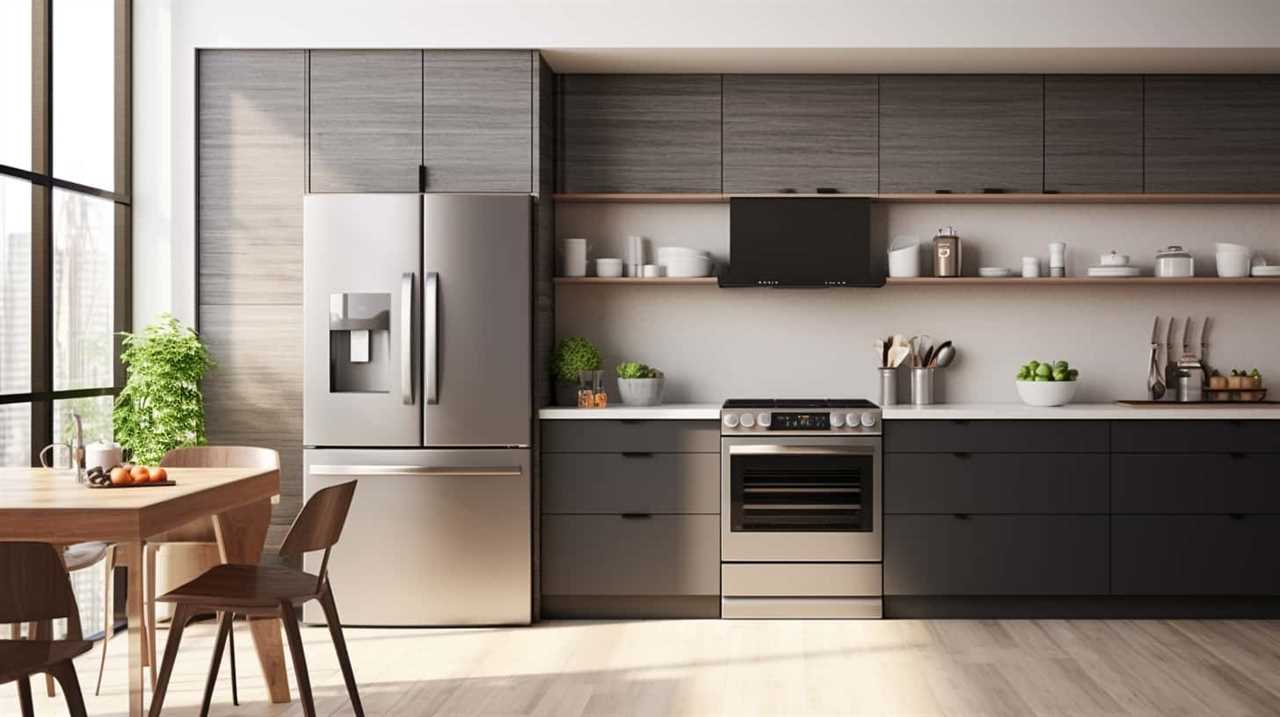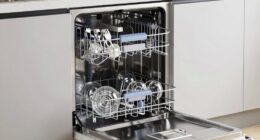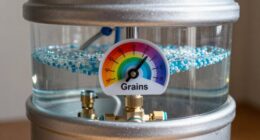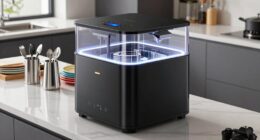To achieve energy efficiency and promote sustainable living, it is crucial to comprehend the power consumption of household appliances. This awareness empowers people to make enlightened decisions regarding their energy consumption and ultimately lessen their environmental footprint.
This article aims to shed light on the appliances that consume the most power, providing crucial insights for those seeking mastery in managing their household energy consumption. By identifying these power-hungry culprits, such as refrigerators and freezers, air conditioners, water heaters, clothes dryers, and electric ovens and stoves, individuals can make conscious decisions to optimize their energy usage and potentially save on utility bills.
With a professional tone and language suited for an informed audience, this article aims to empower readers with the knowledge needed to make energy-conscious decisions regarding their appliances.
Key Takeaways
- Refrigerators and freezers consume a significant amount of energy in households, with the average refrigerator using around 600-800 kilowatt-hours (kWh) of electricity per year.
- Air conditioners are one of the biggest energy consumers in homes, using around 3,500 watts of electricity per hour on average. Setting the thermostat to a higher temperature and using ceiling fans can help reduce energy usage.
- Regular maintenance and choosing energy-efficient models for water heaters can optimize energy consumption and lead to cost savings.
- Clothes dryers use a significant amount of energy, consuming around 2,000-4,000 watts of electricity per hour on average. Air-drying clothes and cleaning the lint filter after each use can improve efficiency and save energy.
Refrigerators and Freezers
Refrigerators and freezers are significant power consumers in the household. When considering energy efficient models, it is important to look for features such as adjustable temperature settings, advanced insulation, and smart sensors that optimize energy usage. These models often display the Energy Star label, indicating that they meet strict energy efficiency guidelines.
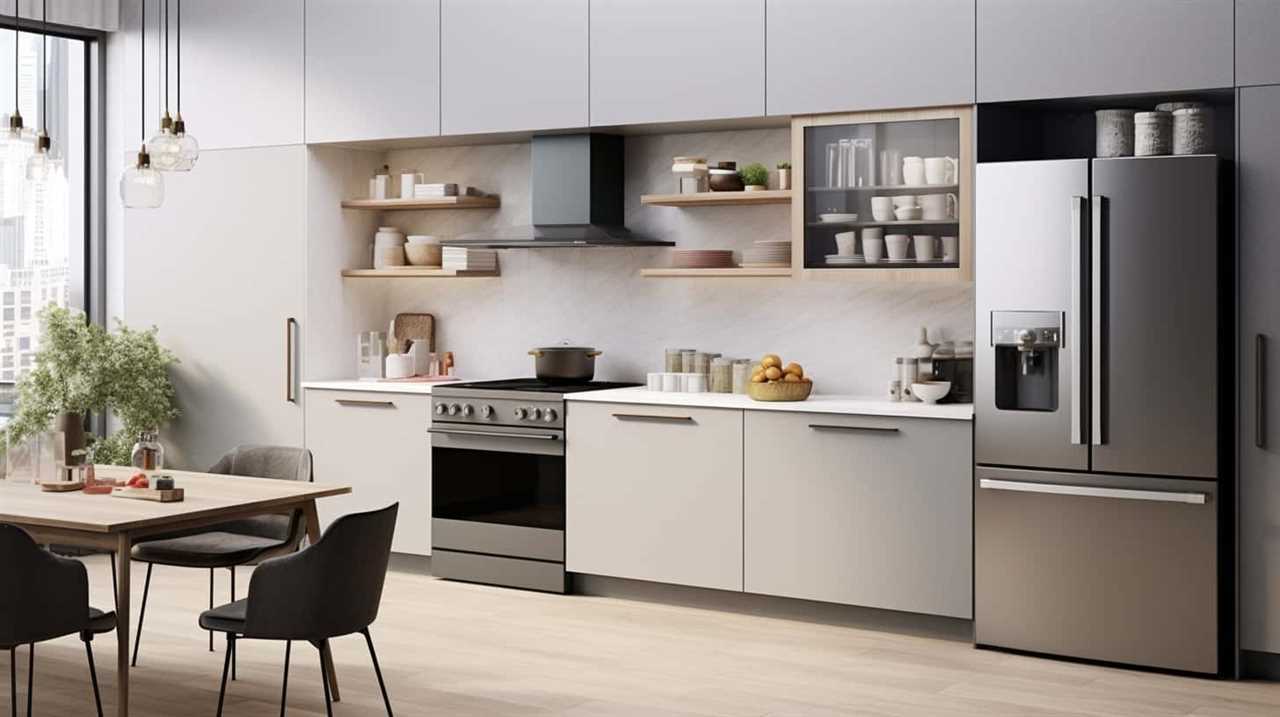
In addition to selecting an energy efficient model, there are several tips for reducing refrigerator and freezer energy consumption. First, keep the temperature settings at the recommended levels, usually between 37 to 40 degrees Fahrenheit for the refrigerator and 0 to 5 degrees Fahrenheit for the freezer. Regularly defrosting the freezer and keeping both appliances clean can improve their efficiency.
Moreover, avoiding placing hot or warm food directly into the refrigerator or freezer can also help reduce energy consumption. By implementing these measures, households can effectively lower their energy usage and contribute to a more sustainable future.
Air Conditioners
Air conditioning units are significant energy consumers in households and require careful consideration for efficient usage.
When it comes to energy efficiency, choosing the right size of air conditioner for your space is crucial. An oversized unit will consume more energy, while an undersized unit will struggle to cool the area effectively.

Regular maintenance is also essential to ensure optimal performance and energy efficiency. Cleaning or replacing air filters regularly improves airflow and reduces energy consumption. Additionally, checking and sealing any leaks in the ductwork can prevent energy wastage. Proper insulation of walls and windows can also minimize heat transfer, reducing the workload on the air conditioner.
Water Heaters
Water heaters are significant energy consumers in households and require careful consideration for efficient usage. To optimize energy consumption, regular water heater maintenance is crucial. This includes flushing the tank to remove sediment buildup, insulating the pipes to minimize heat loss, and checking for leaks or malfunctioning parts.
Additionally, replacing old, inefficient water heaters with energy-efficient models can result in substantial energy savings. Energy-efficient water heaters are designed to reduce heat loss and heat water more efficiently, leading to lower energy consumption and cost savings. These models may include features such as improved insulation, advanced heating elements, and programmable settings.
Clothes Dryers
One appliance that consumes a significant amount of power is the clothes dryer. Clothes dryers are designed to remove moisture from wet clothes by circulating heated air through them. The energy efficiency of a clothes dryer is an important consideration, as it directly affects the amount of power consumed. Manufacturers have introduced various technologies to improve energy efficiency, such as moisture sensors that detect when clothes are dry and automatically shut off the drying cycle. Additionally, advancements in heat pump technology have led to more efficient dryers that use less energy. Drying time is another factor to consider, as shorter drying times can result in energy savings.

Transitioning to the next section, electric ovens and stoves, it is essential to explore how these appliances contribute to overall power consumption in households.
Electric Ovens and Stoves
Discussing the power consumption of electric ovens and stoves is crucial in understanding the energy usage of household appliances. These appliances are essential for cooking and baking, but they can also be major energy consumers. Here are three key points to consider:
- Energy efficient options: When purchasing an electric oven or stove, look for models that have been certified as energy efficient by organizations such as Energy Star. These appliances are designed to use less energy without compromising performance.
- Cooking safety tips: Proper usage of electric ovens and stoves can also contribute to energy efficiency. Preheating the oven only when necessary, using the right-sized cookware, and keeping the oven door closed while cooking can all help reduce energy consumption.
- Regular maintenance: Keeping electric ovens and stoves clean and well-maintained can ensure optimal performance and energy efficiency. Regularly clean the oven and stovetop, check and replace faulty heating elements, and ensure proper insulation to prevent heat loss.
Frequently Asked Questions
How Can I Improve the Energy Efficiency of My Refrigerator and Freezer?
To improve the energy efficiency of your refrigerator and freezer, consider the following measures: clean the condenser coils regularly, ensure proper temperature settings, minimize door openings, check and replace seals, and consider upgrading to a more energy-efficient model to reduce electricity consumption.
What Are the Different Types of Air Conditioners Available and How Do They Differ in Terms of Energy Consumption?
Different types of air conditioners vary in terms of energy consumption. Energy-efficient air conditioners, such as inverter air conditioners, use advanced technology to regulate the compressor’s speed, resulting in reduced energy usage and improved efficiency.

Are There Any Eco-Friendly Alternatives to Traditional Water Heaters That Can Reduce Energy Consumption?
Energy efficient alternatives to traditional water heaters can significantly reduce energy consumption. Additionally, employing energy saving tips such as using electric ovens and stoves sparingly can further contribute to conservation efforts.
How Can I Reduce the Energy Usage of My Clothes Dryer Without Compromising on Efficiency?
Reducing clothes dryer energy usage can be achieved through energy efficient laundry techniques. By properly loading the dryer, using lower heat settings, and regularly cleaning the lint filter, significant energy savings can be realized without compromising efficiency.
Are There Any Tips for Using Electric Ovens and Stoves in a More Energy-Efficient Manner?
Tips for conserving energy while using electric ovens and stoves include using the appropriate cookware, preheating for the shortest time possible, and utilizing residual heat. Energy efficient cooking techniques for electric ovens and stoves involve batch cooking and using the convection setting.
Conclusion
In conclusion, when it comes to power consumption, refrigerators and freezers, air conditioners, water heaters, clothes dryers, and electric ovens and stoves are among the top energy-consuming appliances.

These power-hungry machines can be likened to insatiable beasts, constantly devouring electricity to fulfill their functions.
It is crucial to consider energy-efficient alternatives and adopt mindful consumption habits to tame these energy-guzzling creatures and reduce our environmental impact.

